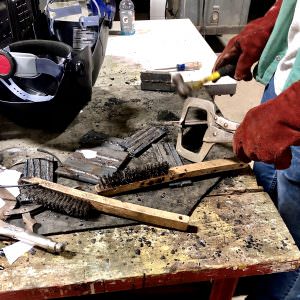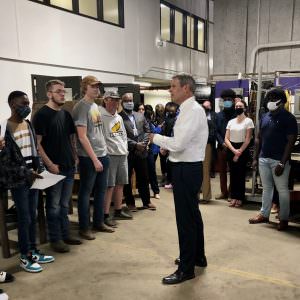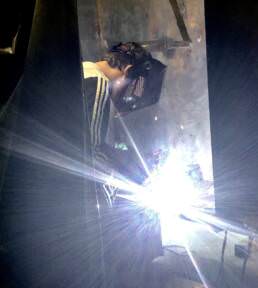Welding at HHS: Fusing Possibilities with Reality
Perhaps now more than ever, graduating high school students have more options for post-secondary education than at any point in public education’s history. Students can choose to further their education at a four-year university or a two year community college. A graduating senior could enlist in one of the military branches of the United States. If a student would rather move to the workforce quicker and obtain specialized occupational skills, he or she may attend a Career/Technical school to begin the process of certification for a particular occupation. Some students can even get a head start to post-secondary education by enrolling in dual credit classes.
Haywood High School (HHS) offers students opportunities to enroll in classes that provide post-secondary credit. One pathway that does this at HHS is the Career/Technical Education (CTE) path. Students enrolled in the CTE program at HHS take classes such as Industrial Maintenance, Coding, Health Science, and even specialized skill classes such as welding.
Welding, like several other specialized skill trades, is in high demand in the United States. The demand will be especially high in Haywood County over the next several years as Blue Oval City begins to grow and add buildings to its campus. Some HHS students are being exposed to the skill of welding early as well as earning credit at Tennessee Colleges of Applied Technology (TCAT) through dual-enrollment.
John Joyner is the welding instructor at HHS and has been employed by the school since 1997. He teaches TCAT Welding, Ag Mechanics, and Ag Power and Equipment. He has also taught Ag Communications and personal finance.
While welding is a stand alone class, the other classes John teaches also incorporate some welding into the class.
“All of my students really enjoy metal cutting and working with metal, so anytime we get a chance to work that into any of my classes, we do,” John said.
The skill of welding is something that can be challenging to learn. Before students are able to even begin that process, though, they have to be very familiar with the safety protocols of the class.
“Students start with safety first and foremost,” John explained. “Then they start working on their basic skills of welding and get exposed to the fundamentals of the process. Students try it out here and have an idea about the process if they want to go to TCAT.”
 The basic skills of welding involve joining metal in ways that could become more challenging depending on the type of cut being made. At HHS, students acquire the fundamentals of welding first.
The basic skills of welding involve joining metal in ways that could become more challenging depending on the type of cut being made. At HHS, students acquire the fundamentals of welding first.
“TCAT really wants students to be able to run a bead and practice running beads and striking arcs – just basic welding techniques,” John explained. “At TCAT, they’ll use different machines and explore different welding scenarios. Here at HHS, we’re just making sure students are getting the basic skills.”
While gaining credit for TCAT while in high school is important, learning the basic skills of welding at such an early age gives students a distinct advantage entering TCAT.
“Welding is a specialized skill, but I can teach my students how to weld. It’s hard work. A lot of people don’t want to do it because it’s tough and requires long hours. But there’s money to be made in that industry for sure,” John said.
Like any high-demand occupation, there definitely is money to be made in welding. More importantly, however, are the options that being a welder can provide from a professional standpoint.
“You can work anywhere from a repair shop of your own to a big manufacturing plant or construction; welding gives you a lot of options. You can travel and repair pipelines on land or in the ocean,” John said.
“Welding is a specialized skill, but I can teach my students how to weld. It’s hard work. A lot of people don’t want to do it because it’s tough and requires long hours. But there’s money to be made in that industry for sure.” – John Joyner
Having a dual-credit welding program at HHS is even more important than it has been with the arrival of Ford and Blue Oval City in the coming months and years. With groundbreaking to take place in the near future, job ready workers will be needed for all types of industrial maintenance and construction, including welding. Students in Haywood County will also be able to have a head start on their timeline to graduation from TCAT and entry into the workforce.
“I’ve been telling my students that by the time they graduate, they’ll be in line for a lot of great things happening locally and across the state. Obviously, Ford is THE big deal but Ford will also bring a lot of other businesses to the area, too,” John explained.
The importance of having unique, dual credit CTE options such as welding and industrial maintenance along with a partnership with TCAT cannot be overlooked. One of the many beauties of public education is its ability to offer students a variety of pathways that meet the learning needs of each student.
The importance of having unique, dual credit CTE options such as welding and industrial maintenance along with a partnership with TCAT cannot be overlooked. One of the many beauties of public education is its ability to offer students a variety of pathways that meet the learning needs of each student.
Lucas Fischer, Skyler Johnson, Jesse Scott, and Austin Parnell were welding students in the fall semester of 2021. All of them are currently in Ag Mechanics this semester and they all plan to continue their education at TCAT after graduating from HHS.
What attracted each of them to the CTE program at HHS was the opportunity to take advantage of hands-on learning. And while they each have different ideas of what they want to do for work, they are all very excited about the possibilities and opportunities that learning these skills early can provide them.
 John Joyner is also very aware of how important classes and programs like this are.
John Joyner is also very aware of how important classes and programs like this are.
“A big advantage to a program like the one at Haywood High School is that our students have an opportunity to get a head start on their career path – whether that’s metal work, electrical work, health sciences, you name it. Those are opportunities that you can’t get in a private school or even in other districts. These opportunities expose our students to possible career options that can help them make some decisions. It’s a taste of the real world before you get to the real world.”
Welding and other programs within the Career/Technical Education field in Haywood County Schools can best equip students for the options and opportunities that await them after high school. Every student deserves multiple choices when it comes to their educational pathway. Whether it’s a four year university, community college, the military, or TCAT, HCS is committed to offering support and learning to students in all areas.


